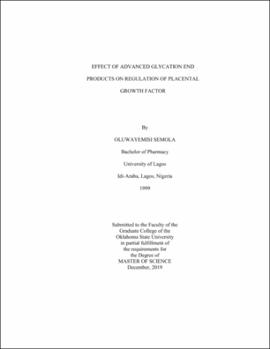| dc.contributor.advisor | Lovern, Pamela | |
| dc.contributor.author | Semola, Oluwayemisi | |
| dc.date.accessioned | 2020-06-29T17:39:21Z | |
| dc.date.available | 2020-06-29T17:39:21Z | |
| dc.date.issued | 2019-12 | |
| dc.identifier.uri | https://hdl.handle.net/11244/324911 | |
| dc.description.abstract | Cardiovascular disease affects nearly half (121.5 million) of the adult US population. In many of these patients, atherosclerotic lesions lead to coronary and peripheral artery disease, causing ischemia of the heart and limbs. Arteriogenesis, a natural compensatory mechanism, restores blood flow to ischemic sites. Placental growth factor (PLGF) is a key arteriogenic growth factor. Interestingly, studies have shown that PLGF is downregulated in people with type II diabetes, potentially contributing to impaired collateral artery growth. However, how diabetes affects PLGF expression is not well defined. Advanced glycation end products (AGE) and inflammatory cytokines such as tumor necrosis factor-a (TNFa) have been implicated in vascular pathology. We therefore hypothesized that AGE-TNFa signaling would impair PLGF expression in endothelial (EC) and/or skeletal muscle cells (SKMC). To test this hypothesis, human coronary artery EC and SKMC were treated with AGE, bovine serum albumin (BSA, as a control for AGE), or TNFa. AGE had no direct effect on PLGF in EC and SKMC. However, TNFa reduced PLGF in EC (P<0.001) but had no effect on PLGF levels in human and mouse SKMC. In order to determine whether AGE might influence PLGF in EC or SKMC through a macrophage-mediated effect, RAW 264.7 murine macrophages was treated with AGE or BSA. RAW media was then transferred to murine endothelial cells (EOMA). Treatment with both RAW-BSA and RAW-AGE media significantly reduced PLGF levels in EOMA cells, compared with control RAW media (P<0.001). Interestingly, ELISA analysis showed that TNFa was increased in RAW-AGE media, but not in RAW-BSA media or RAW-control media (P<0.0001). Analysis of RAW media using a multiplex mouse cytokine assay confirmed that TNFa was increased in RAW-AGE media compared to RAW-BSA and RAW-control media (P<0.007). We conclude that AGE may act to reduce PLGF expression in EC via a macrophage-mediated mechanism involving induction of inflammatory cytokine secretion. These new insights have the potential to lead to future therapies to improve collateral growth in patients with type II diabetes. | |
| dc.format | application/pdf | |
| dc.language | en_US | |
| dc.rights | Copyright is held by the author who has granted the Oklahoma State University Library the non-exclusive right to share this material in its institutional repository. Contact Digital Library Services at lib-dls@okstate.edu or 405-744-9161 for the permission policy on the use, reproduction or distribution of this material. | |
| dc.title | Effect of advanced glycation end products on regulation of placental growth factor | |
| dc.contributor.committeeMember | Lacombe, Veronique | |
| dc.contributor.committeeMember | Ritchey, Jerry | |
| osu.filename | Semola_okstate_0664M_16574.pdf | |
| osu.accesstype | Open Access | |
| dc.type.genre | Thesis | |
| dc.type.material | Text | |
| dc.subject.keywords | advanced glycation end products (age) | |
| dc.subject.keywords | arteriogenesis | |
| dc.subject.keywords | collateral artery growth | |
| dc.subject.keywords | diabetes | |
| dc.subject.keywords | placental growth factor (plgf) | |
| dc.subject.keywords | tumor necrosis factor alpha (tnf alpha) | |
| thesis.degree.discipline | Veterinary Biomedical Sciences | |
| thesis.degree.grantor | Oklahoma State University | |
